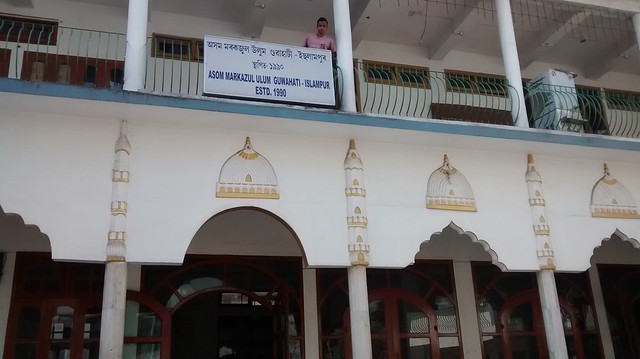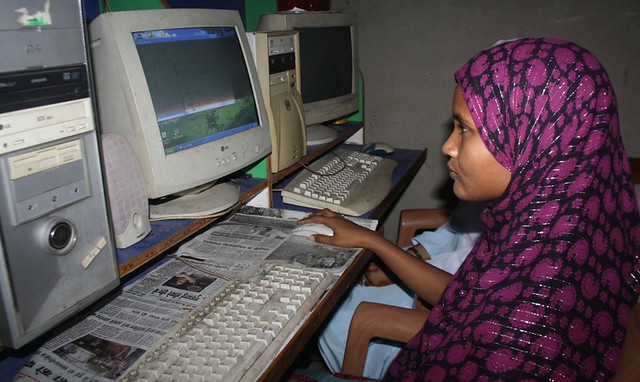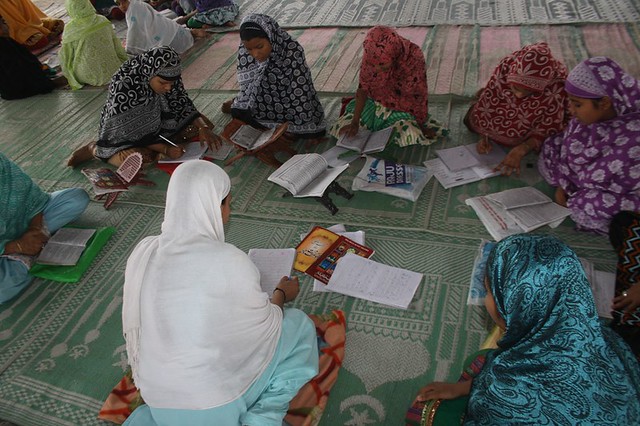By A Ghiasuddin, TwoCircles.net,
Guwahati: Madrassas across the country earned a bad name after the Burdwan bomb blast in October. Allegations, including by sections of the media, flew in thick and fast that anti-national lessons are taught at madrassas and that these institutions are a hub of terror.
Few days ago, based on alleged Intelligence reports, it was reported that Assam was emerging as a centre for Al Qaeda activities. In wake of such reports and strong sentiment emerging from within the community against such reports, TwoCircles.net visited a few madrassas in Assam for a reality check.
Asom Markazul Ulum Guwahati at Islampur, Guwahati – where even Hindus donate for education of poor students
As one enters the Asom Markazul Ulum madrassa at Islampur right in the middle of the city, students can be seen busy readying the texts from holy Quran. The atmosphere is akin to any school, the only difference being that the students sit on the floor reciting verses.
Their teacher is guiding them how to improve their performance. This madrassa teaches traditional lessons of Quran but it also ensures that students get non-religious education. Hence subjects such as English, Assamese and even computer education are part of the regular curriculum.

There is nothing that one can identify with so-called Jihad or any other anti-national activity.
Madrassa’s head Hilal Qasimi told TwoCircles.net that Muslims at present are poor in all aspects compared with similar groups in the society. “Many reports have hinted that Muslims are the most backward people in the country. It is our duty to work towards developing the community by providing quality education.”
Realizing the importance of modern education, it promises to give its students the best possible lessons, even though the madrassa suffers from financial hindrances. It runs on the donation given by neighbours. “We want these students to be self-dependent once they finish their studies here. We are grateful to the people here for donation that makes our job easier. In fact, even Hindus in the neighbourhood whole-heartedly donate and support us in teaching our students,” Qasimi said.

Madrassatul Banat, at Hatigaon, Guwahati
Located away from the heart of the city, Hatigaon is not much developed infrastructure wise. So for this Muslim dominated neighbourhood, Madrassatul Banat is a gift, more so, as it is the first ever madrassa exclusively for girls in Guwahati.
“There are number of madrassas in the state for boys but as there was not much opportunity for girls, we decided to establish one for girls here. It is very unfortunate that a section of people is trying to ill-fame the educational institutions such as madrassas,” its principal Maulana Manzur Ahmad Mishbahi said.
Apart from teaching traditional subjects, the madrassa has introduced computer education along with Assamese, English and Mathematics. Besides, it has sewing machines for the girls to help them earn a livelihood once they graduate. “We want our girls to not just have the Islamic education but also general lessons so that they can be self-reliant once they complete education here,” he said.

Students attend a teaching session at Asom Markazul Ulum Guwahati at Islampur
Madinatul Ulum Madrassa, Dalgaon in Darrang district
About 100-odd kms from Guwahati is Dalgaon in Darrang district. This is mostly an agrarian community, with Muslims forming about 65-70% of the population. Most students of the Madinatul Ulum Madrassa here come from extremely poor families. There are in all 160 students.
For now, apart from the traditional curriculum, this madarssa also teaches Assamese, English and general studies. But due to paucity of funds and other logistics, there is no computer education class. “We plan to introduce computer education once we are able to garner more funds,” Ali said.

Girl students during their class at Madrassatul Banat in Guwahati
Where is the question of “jihad”, terror?
Islampur’s Qasimi said, “We are glad that we live in a secular country like India where we can freely practice our religious rituals. We condemn all those ‘anti-social elements’ who create nuisance in the society in the name of Islam.”
He further elaborated, “Jihad is a word which signifies one’s own fight with himself or herself. It means how to control your-self from doing ill things. In earlier times, people used to fight for the sake of religion or for their existence. But the situation is not like that anymore. Islam does not propagate any kind of hatred or killing innocent people like this. These terrorists are working for their own agenda while defaming the name of Islam,” he said.

Principal Maulana Manzur Ahmad Mishbahi during a class at Madrassatul Banat in Guwahati
Pointing out how lack of funds had always made it difficult for him to continue providing good education to his poor students, Dalgaon’s Ali, in an exasperated tone, wondered: “It’s quite ridiculous how somebody can allege that illegal activities take place inside madrassa?”
The teachers and principal of these madrassas, however, said that if somebody is found doing illegal practices, be it in madrassa or anywhere, he/she should be punished.
“Proper investigation should be carried out across the state. If somebody is found guilty, even in madrassa, he/she should be punished and that particular madrassa should be banned,” Qasimi said.

